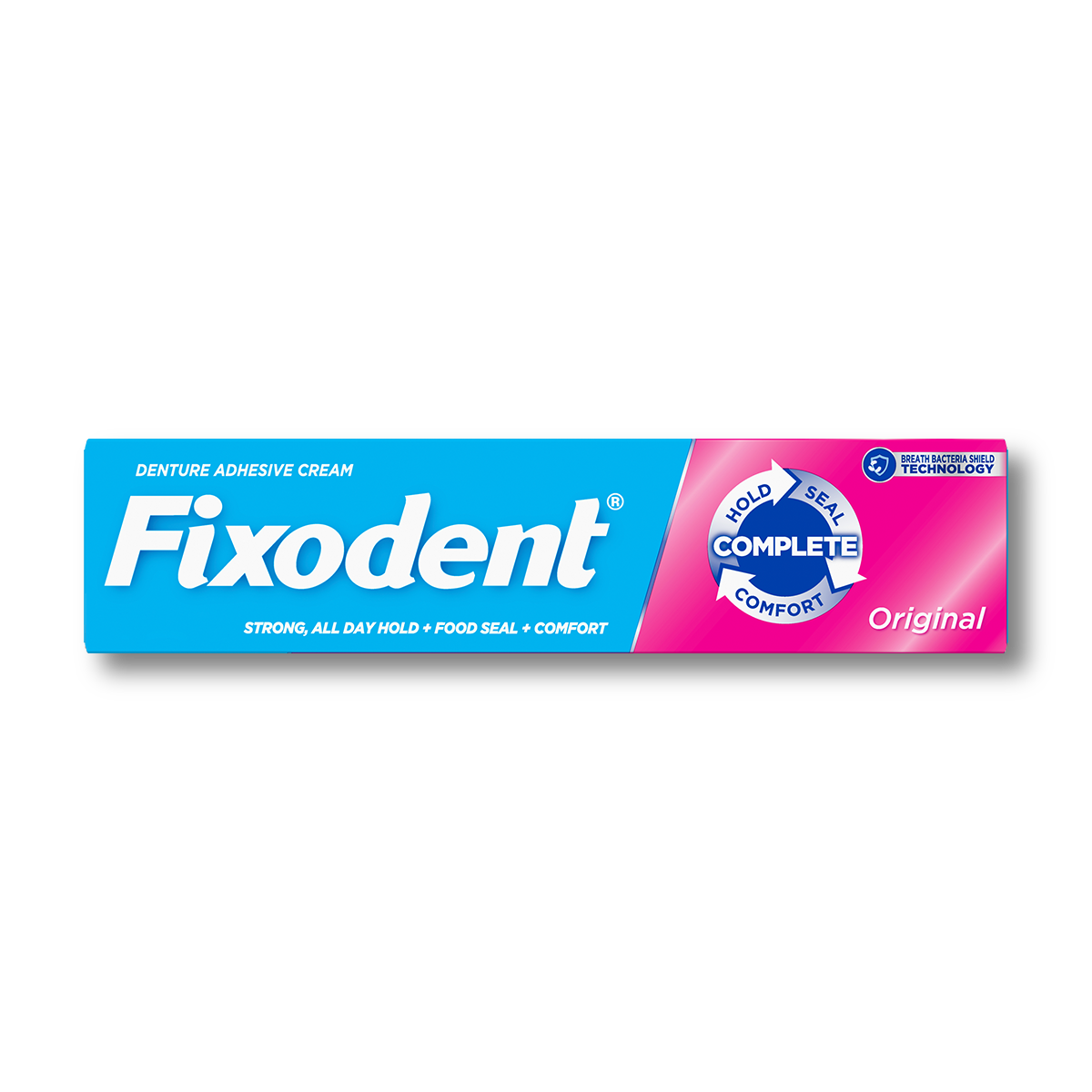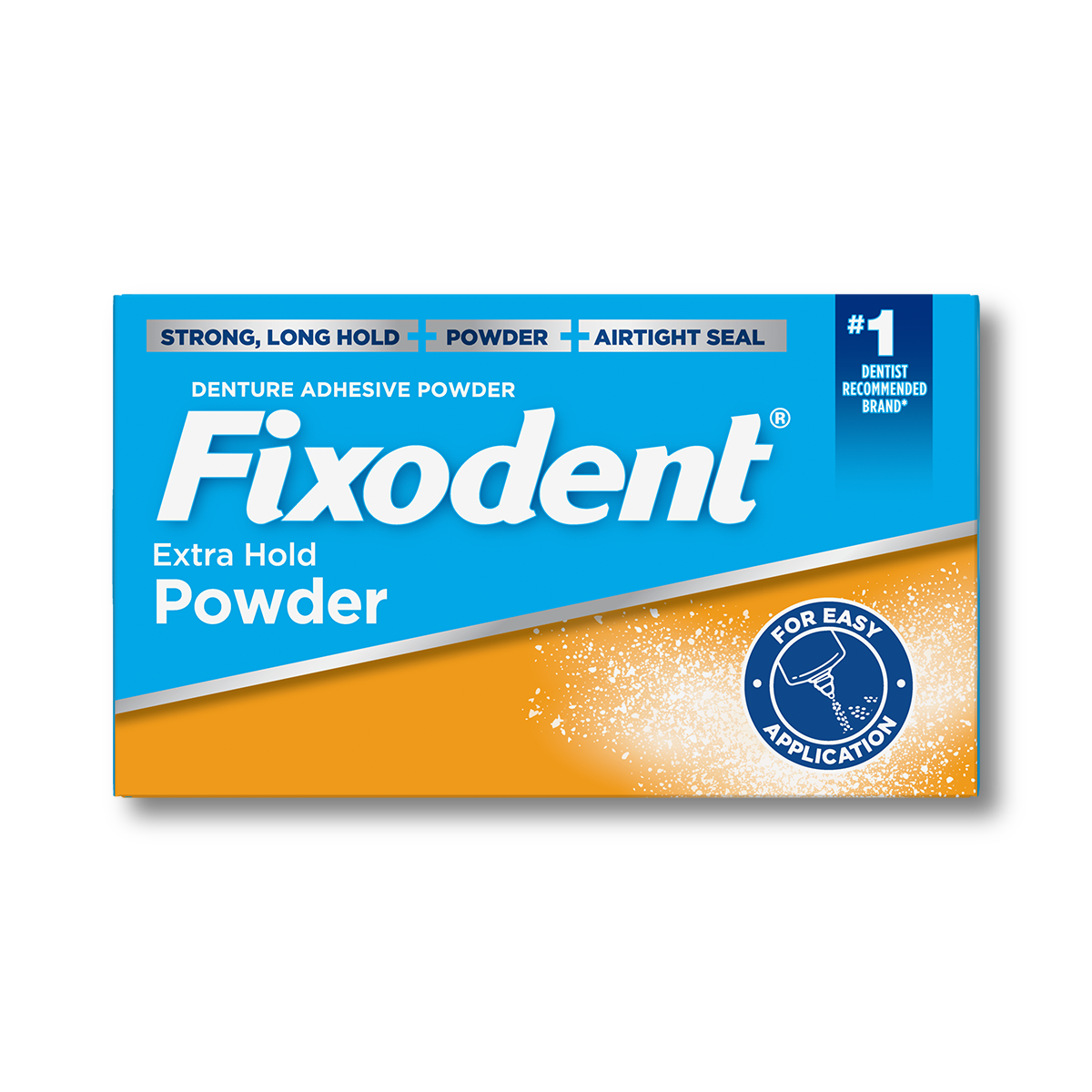Dentures can be an affordable and effective way for people with missing teeth to regain their beautiful smiles. However, with all the adhesive options available on the market, it can be difficult to figure out which is the best dental adhesive.
That's why in this article, we will review some popular brands, so you can live your best life with dentures that fit like they should. If you don't have time to go through all of the reviews, you can simply have a look at the following table where we summarize each product!
[wptb id="39303" not found ]In This Article
How does denture adhesive work?
Denture adhesive works by using saliva to “glue” the denture to the tissue. Denture adhesive contains ingredients that react with your saliva to form an elastic layer, or membrane, which ‘sticks' to your mouth. This layer also helps fill any small gaps that may be causing your dentures to dislodge easily.
Whether you choose strips, powder, gel, or cream, all denture adhesives work in more or less the same way. Firstly, they form a strong bond with your dentures for stability. And secondly, they adhere to your gums to enhance the natural suction that holds your dentures in place.
The benefits of using a denture adhesive are two-fold:
- Stop them from moving: Adhesives fix dentures to your gums securely, eliminating irritating movement and keeping them from falling off when you eat, speak, or laugh.
- Keep food out: Loose dentures let food get trapped between your dentures and your gums which can lead to irritation and pain.
What are the different types of denture adhesive?
There are different types of denture adhesives available on the market in the form of creams, powders, and strips. Each of these types has different instructions for use and also varies in terms of how effective they are.

Have a look at the three types of dental adhesive products that you can choose from:
- Adhesive Cream: Denture adhesives in the cream form are one of the most widely available types on the market. To use denture cream, apply a small amount of the cream to the undersurface of the dentures. Press the denture and hold it in place on your gums to secure the grip from the adhesive. The main advantage of using adhesive cream is that it offers a strong hold. It is also a popular choice to prevent irritation of the gums and tends to come in a variety of flavors to add freshness to your mouth.
- Adhesive Powder: If you cannot find adhesive creams, an adhesive powder is a popular alternative. It can hold your dentures for up to 12 hours depending on the specific product you use. Apply a light layer of the powder onto the undersurface of the dentures. Shake off any excess powder before pressing down. Biting down on the denture will help to secure it in place. Like creams, adhesive powders can also provide an all-day hold. The powder form is also convenient to use.
- Adhesive Strips: The use of denture adhesive strips is relatively new but is equally convenient for denture wearers as the first two types. Strips are generally easy to apply and meant for all-day use, just like the other types. To use, you need to peel off pre-cut strips that contain the adhesive material. Moisten your denture adhesive strips with water to allow them to cling to the undersurface of the denture. Press and bite down onto it to secure it in place. This is one of the easiest dental adhesive forms to use because it is basically mess-free.
What to look for in denture adhesives

Choosing the best denture adhesives can be difficult. There are many strong products on the market and it can overwhelm anyone, especially if you are new to buying adhesives. Use the following factors as a guideline when choosing which adhesive to purchase:
- Ingredients: Some of the adhesive products on the market contain zinc. Zinc has many benefits but can cause nerve damage when you are exposed to too much of it. If this concerns you, choose adhesives that have a zinc-free formula just to be on the safe side.
- Cost: Aside from a zinc-free formula, the cost of the denture adhesives is another important factor to consider. A product that is more expensive does not necessarily mean it is of better quality. And adversely, just because a product is cheap doesn't necessarily make it worth buying. So find one that fits your budget, while still being a quality product with good reviews.
- Application: The type of denture adhesives you select will impact how they are applied or used. If you are always on the go, you want to be able to choose an adhesive that is easy to apply.
- Reviews: When choosing a denture adhesive, it's always a good idea to read some reviews. Make sure these are from actual users who have tried the product for themselves for an accurate assessment. For example, you can type in Google, “best denture adhesive without zinc”. Look through all the reviews from customers of several providers in order to gather enough information about which products are worth your time and money.
What are the best denture adhesives on the market?
The best denture adhesives on the market are those that provide comfort and stability. In order to find the best denture adhesive available, we'll look at some of the popular and top-rated products, including the best adhesives on the market from Poligrip and Fixodent, below.
You'll often find debates about whether Fixodent vs Poligrip is better because these two are probably the most popular options right now. But which one is the best for you?
Below, we'll explore the features, as well as the pros and cons of each option (including creams vs powders) to help in making your decision. No matter what, it's always best to consult your dentist before deciding on an adhesive.
Super Poligrip denture cream adhesive

This is probably the most recommended denture adhesive brand by dentists and for good reason. The product is well-loved for its all-around dependability and comfort seal. Also, Super Poligrip offers different formulas for their adhesive creams, allowing users to find the right one for their needs.
The Super Poligrip Extra Care variant, for instance, prevents irritation of the gums. For all-day fresh breath, there’s the Ultra-Fresh variety, which comes in mint flavor.
The great thing about the updated Super Poligrip Original Formula is that it has a zinc-free formula, keeping its users safe from zinc toxicity.
Super Poligrip extra strength powder
This product is an easy-to-use adhesive powder, especially useful to those who are new to dentures. It is easy to apply, and seals and bonds for up to 12 hours. It is also free of zinc and comes in an original fresh flavor.
Fixodent denture adhesive cream

Another good denture adhesive brand is Fixodent, and its adhesive cream is one of the most dependable products in the market. It is also one of the most recommended brands by dentists in the U.S. Its active ingredient reacts to water quickly for a fast, tight seal.
Thanks to the extra-strength formula, Fixodent offers leakage protection, easy usage, and excellent cushioning for ill-fitting false teeth. Also, since the cream is not flavored, you will not taste any odd flavor in your mouth. Some people may prefer this to strong mint flavors.
Fixodent also offers a money-back guarantee. If you’re unsatisfied with their product, you can get your money back within 60 days. If you need help applying your denture cream, watch the video below from Fixodent.
Fixodent Extra Hold denture adhesive powder
While most people prefer creams, some prefer powder for its hold and even feel on the gums. When it comes to the strength of hold, Fixodent Extra Hold Denture Adhesive Powder is one of the most preferred brands among customers today.

The good thing about this product is it is also cheaper (per application) than most creams, making it the more reasonable choice for people on a budget.
When applied correctly, this adhesive can better prevent food particles from getting under the dentures compared to many other creams. It may take some time to learn how to apply it for optimal results.
Although denture adhesive powders don’t offer the convenience of creams, Fixodent’s product provides a long-lasting hold and tight seal.
When choosing between Poligrip and Fixodent, it really comes down to personal needs.
With that said, Poligrip may be best for people who want a secure hold that lasts all day. They have the best denture fixing cream in the market. Poligrip is also zinc-free.
Fixodent is a good option as well, especially for people who prefer the subtle and even feel of powder adhesive on their mouths. It may require some time to learn how to apply the adhesive perfectly, but it would be time well spent. This option is also free of zinc.
Sea Bond denture adhesive seals

Another product you may want to add to your list of best denture adhesives is Sea Bond seals. This is neither a cream nor a powder, but rather almost like double-sided tape for your dentures.
Unlike other denture glue products that can be messy to deal with, this one is zinc-free and applies very easily. To use the Sea Bond Secure Adhesive Seals, place them directly onto the undersurface of your clean denture. If there is any overlapping adhesive, you can trim it off with scissors.
Once you get the size right, trim it on all sides to ensure a perfect fit. Place the denture adhesive on the denture with the white side up (with the pink side facing your denture). Lightly moisten it with a spray of water. Use your fingertip to gently tap on the seal.
Avoid over-saturating your denture with water. When you place the denture back into your mouth, bite evenly on all sides for 5 seconds. Make sure you change your seal daily for optimum results.
This product has gotten plenty of stellar reviews because it does its job of securing your dentures properly. Plus there's no excess cream that you have to worry about once you bite down on the denture to secure it into place.
Secure denture adhesive cream by Dentek
The Secure denture adhesive cream by Dentek is another popular option. Just like the one from Sea Bond, this is also zinc-free. It promises to bring up to 12 hours of holding power.

You can apply it in the morning and it will last all day. There is no need to re-apply every few hours so you can get more use out of every box. You will only need 2 to 3 pea-sized drops with every application.
It is also made with advanced waterproof adhesive that differentiates it from any other non-water-soluble adhesive formulas.
The adhesive cream is flavor-free, which makes it a great option for those who want to maintain a neutral taste in their mouth. This is an economical option as well if you want to have peace of mind when wearing dentures.
Ezo Denture Cushions

The Ezo Denture Cushions are a temporary aid for loose dentures and are made with a vacuum grip technology that seals dentures in your mouth without using creams or powders. The vacuum grip is actually meant to mimic the perfect hold your dentures had when you first got them.
The cushion is made with pure cotton flannel, corn oil, and paraffin wax. It is also zinc-free in formula and has no bad taste or odor.
How to apply denture adhesive in partials
If you have a partial denture, you can also use adhesive to secure it into place. You can choose from any of the aforementioned products if you're looking for a good option. When you first get your partial denture, your dentist will ensure that it fits firmly with the rest of your teeth and gums.
But if you want to achieve that extra hold and prevent food particles from penetrating it, you can use an adhesive. The first thing you need to do is clean your partial denture. Use a soaking solution or run it under clean water.
pat it with a towel to dry before you apply a fresh coat of the adhesive. By keeping the surface clean on your dentures, you will have an easier time applying the adhesive. Make sure to rinse your partial denture every after use to remove any residual adhesive.

Other solutions for badly fitting dentures
If your dentures aren't fitting quite properly, you may need a denture reline. You may need a reline when changing your adhesive just isn't working anymore.
Many relines are done at the dentist's office, but there are also at-home reline kits like DenSureFit that can possibly save you a trip. You can read our DenSureFit reviews article to learn more.
How to keep dentures in place without glue
The use of adhesives is one of the best ways to keep them secured in place. But there are also a few lifestyle choices you need to make so that you can limit the movement of dentures. Take note of these tips to help care for your dentures:
- Avoid eating sticky foods: A good example of this is chewing gum. When you are wearing dentures, you need to avoid sticky foods because they can cause them to slip or fall out of place. Instead of chewing gum to keep your breath fresh, you can substitute it with mouthwash or breath mints.
- Keep dentures moist: The base of your denture is made with flexible polymer materials. Keeping the polymer moist will enable the material to bend easily. This will, in turn, enable you to secure it into position with ease and enjoy a comfortable seal. On the other hand, when the dentures are too dry, they can become brittle. So, when you take your dentures off, it is important that you soak them in water or any denture solution that will keep them moist.
- Handle with care: You need to be very cautious when handling your dentures so as not to break or deform them. When putting your dentures on, always do it in front of a mirror so you can correctly position things. If you use too much force or drop them, this can cause damage that will affect the fit.
- Get them adjusted: If you notice that your dentures are constantly slipping out of place, it might be time to visit your dentist. They can re-adjust the fit of your dentures so they can fit comfortably and be secured in place. They can also advise you on finding the best denture glue for your needs.
For more information, you can read our separate article on how to make your dentures fit better.
Conclusion
Dentures are meant to fit perfectly in your mouth, without slipping, sliding or falling out. When you first get your dentures, they will provide a perfect fit, but many people find that after a while, dentures stop fitting so well.
This can be due to daily wear and tear of the denture, or a change in the actual structure of your mouth.
If you can, it's best to consult your dentist about your options, to see if you can get new dentures, a denture reline, or even graduate to dental implants. But if that's not possible, then your next best option is to choose the best denture adhesive for you and your oral health.
FAQs
What type of glue can you use to fix dentures?
The glue you can use to fix your dentures is not the same adhesive you use to keep them in place. You can get a denture repair kit that contains cement bonding material or dental glue. This will enable you to put your dentures back into place temporarily.
Make sure you choose adhesives that are FDA-approved when repairing your dentures. Otherwise, it can be harmful to use and can even damage your dental appliances. Avoid using household glues as some of them could contain poisonous materials.
What is the strongest denture adhesive on the market?
The strongest denture adhesive on the market is Fixodent Extra Hold. It forms a tight seal between your dentures and your teeth and lasts a long time. This ensures a good grip and prevents food particles from getting trapped.
What is the best way to get denture adhesive off your gums?
Sometimes denture adhesive is a little too effective—and you can't even get it off your gums. When this happens, gently brush your teeth and gums with toothpaste and warm water. You can also try gargling using mouthwash.




